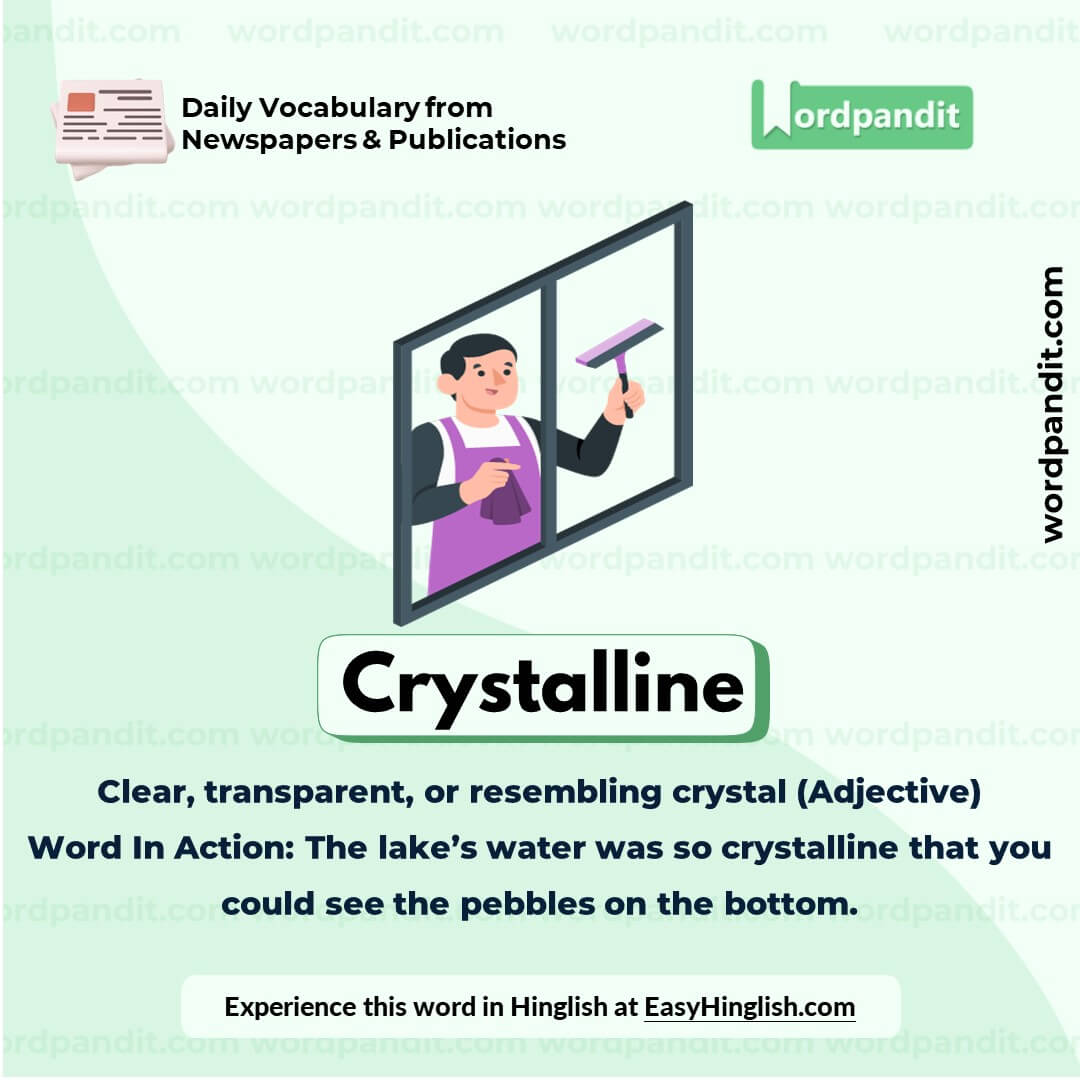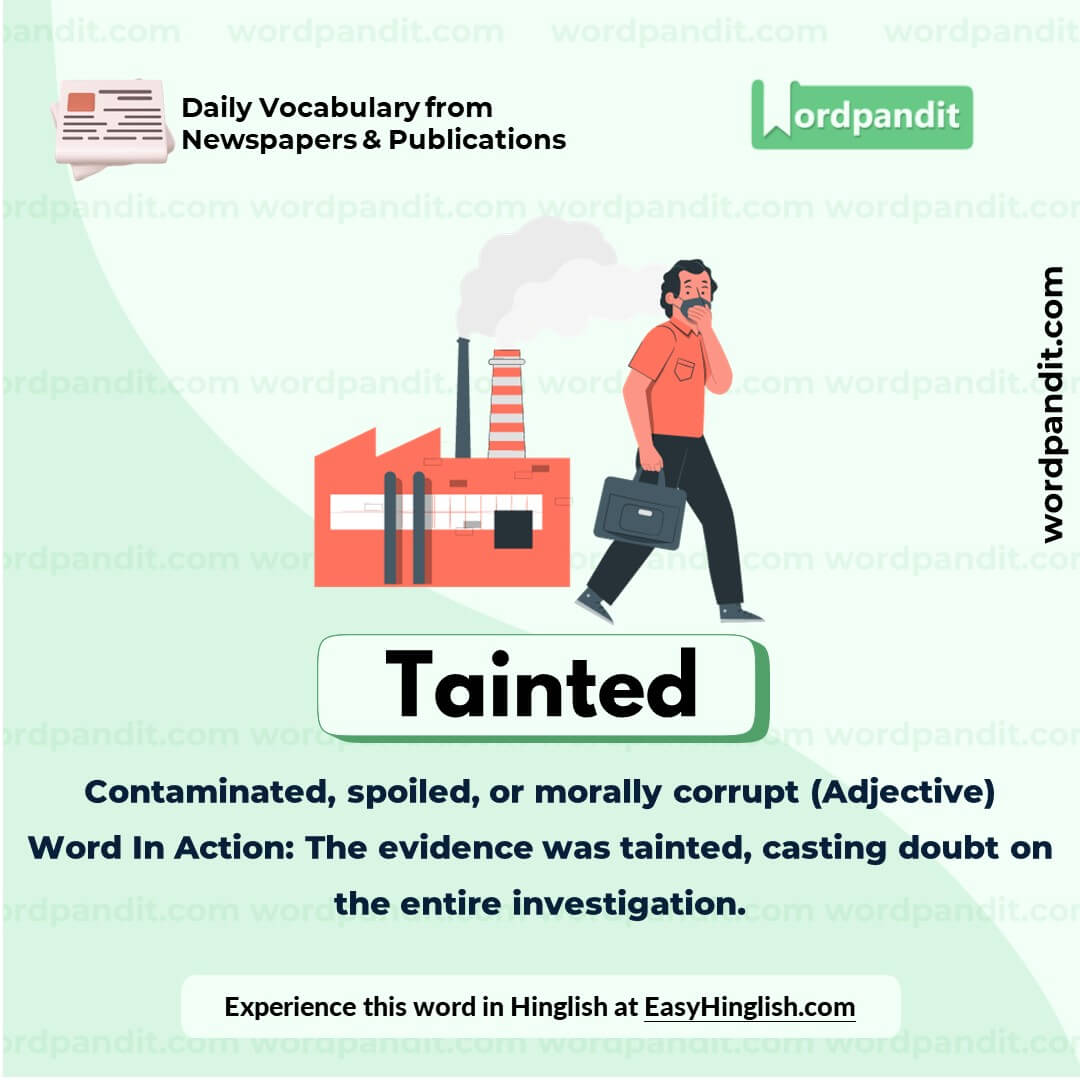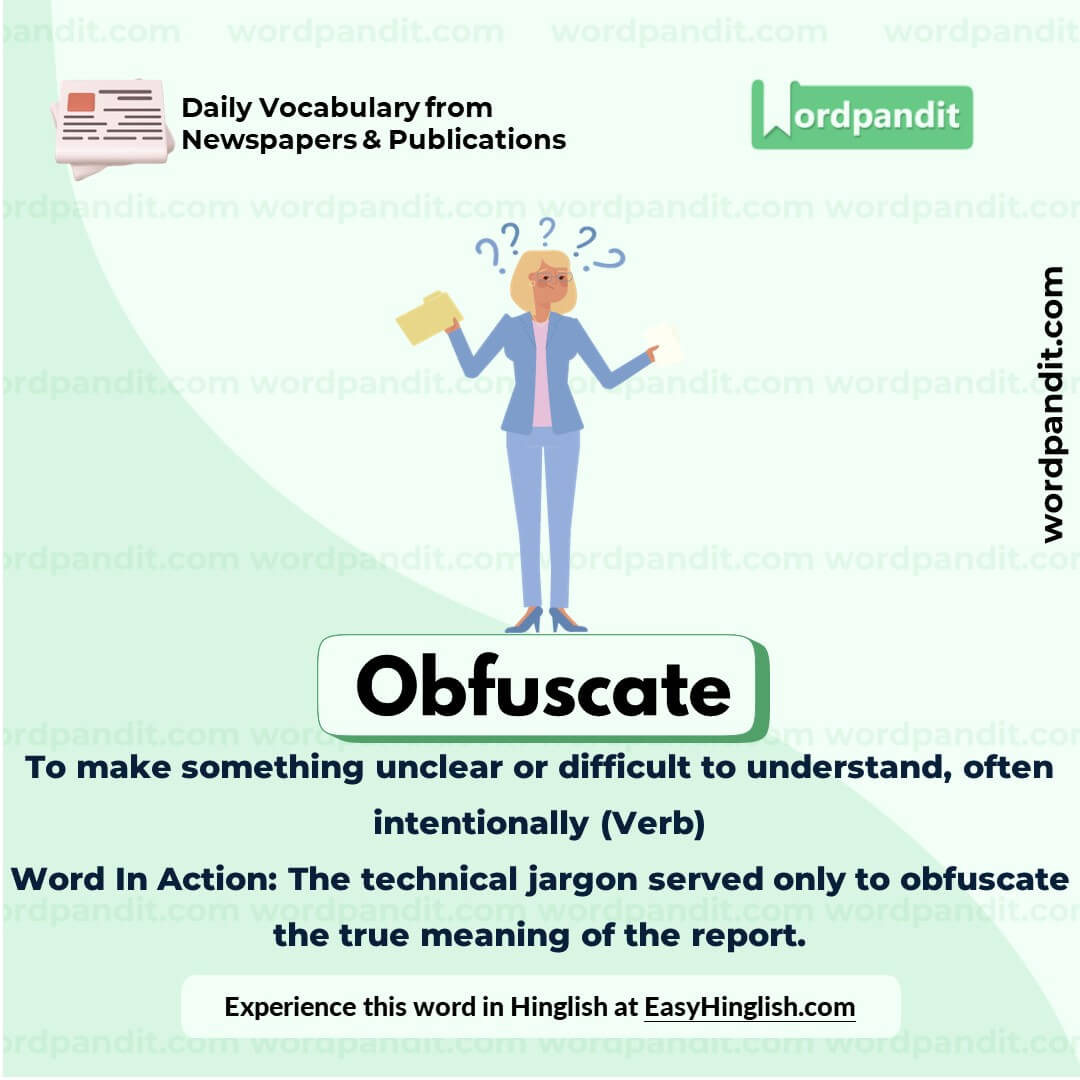Daily Vocabulary from International Newspapers and Publications
Expand Your Vocabulary with Wordpandit’s Global Vocabulary Hub
At Wordpandit, we are committed to helping you develop a truly global vocabulary by drawing from some of the most respected international publications. This section is designed to keep you ahead of the curve by introducing you to words that define global conversations and trends.
The Power of Global Sources
To help you think and communicate on a global scale, we curate vocabulary from renowned international sources, such as:
- The New York Times
- The Washington Post
- BBC
- The Guardian
- The Economist
- Scientific American
- Psychology Today
- And many more...
Stay Global, Stay Competitive
Our daily updates from international publications ensure you are consistently exposed to new words that reflect global news and developments, making sure your vocabulary is not only current but also globally relevant.
Enhance Your Global Perspective
Whether you’re preparing for international exams, aiming to excel in global business communication, or want to enhance your language skills for personal growth, Wordpandit offers the resources you need to thrive in a global context.
Effective Learning, Global Reach
Our learning methodology combines global examples, memory aids, and interactive activities, allowing you to internalize new words effectively and apply them in real-world scenarios.
Begin Your Global Vocabulary Journey Now!
Why Choose Wordpandit?
Practical Learning: Focus on words you'll actually encounter in real-world reading, enhancing your comprehension and communication skills.
Diverse Content: From current affairs to scientific breakthroughs, our varied sources expose you to vocabulary across multiple domains.
Effortless Integration: Make Wordpandit a part of your daily routine. Just a few minutes each day can significantly boost your lexicon over time.
Your Path to Vocabulary Mastery
- Visit our Daily Vocabulary section regularly
- Explore new words and their usage in context
- Practice incorporating these words into your own writing and speech
- Track your progress as your vocabulary expands
Start Your Journey Today
Embark on your vocabulary enhancement journey with Wordpandit. By consistently engaging with our daily posts, you'll build a robust vocabulary that serves you well in academic, professional, and personal contexts.
Remember, a word a day keeps linguistic limitations at bay. Make Wordpandit your daily companion in the quest for vocabulary excellence!
WORD-1: Recipient
Context:
"The reasoning behind this is that it gives recipient countries to spend the money in the most efficient way, and gives the providing country some form of accountability over how the money is spent." - The Guardian
Explanatory Paragraph:
The term "recipient" refers to a person, organization, or country that receives something, such as a gift, payment, award, or benefit. It emphasizes the act of receiving and is often used in formal contexts like grants, donations, or official aid. In the given context, "recipient" describes countries receiving financial support or aid.
Meaning: One who receives something (Noun)
Pronunciation: reh-SIP-ee-uhnt
Difficulty Level: ⭐⭐ Beginner
Etymology: Derived from the Latin word "recipiens," meaning "to receive," from the verb "recipere."
Synonyms & Antonyms:
Synonyms: beneficiary, awardee, payee, grantee
Antonyms: donor, giver, provider, benefactor
Usage Examples:
- The recipient of the scholarship expressed heartfelt gratitude during the ceremony.
- All recipients of the email are requested to respond by Friday.
- The charity carefully selects recipients for its annual donations to ensure fair distribution.
- The recipients of the aid package were grateful for the timely support during the crisis.
Cultural Reference:
"The Nobel Peace Prize recipient for 2021 emphasized the importance of journalistic freedom in strengthening democracy." - Paraphrased from Nobel.org
Think About It:
How does being a recipient of aid influence a country or individual's sense of responsibility and accountability?
Quick Activity:
List three scenarios where you or someone else might be considered a recipient. For each scenario, identify what is being received and by whom.
Memory Tip:
Think of the word "receipt" as a clue—both "receipt" and "recipient" relate to receiving something.
Real-World Application:
The term "recipient" is widely used in international aid, finance, awards, and recognition, emphasizing the role of those who benefit from specific actions or transactions.
WORD-2: Delegate
Context:
"That will confuse the delegates at Cop29, who remain a long way from any success, and who also remember Aliyev’s extraordinarily undiplomatic statements at the start of the summit." - The Guardian
Explanatory Paragraph:
The word "delegate" refers to a person chosen or elected to represent others, especially in a formal meeting or conference. Delegates typically have the authority to speak and act on behalf of a larger group. In the context of COP29, delegates are representatives from various countries or organizations attending to discuss and negotiate climate-related issues.
Meaning: A person authorized to act on behalf of others (Noun); to assign responsibilities or tasks to another (Verb).
Pronunciation: DEL-uh-gate (Noun); DEL-uh-gayt (Verb)
Difficulty Level: ⭐⭐ Intermediate
Etymology: From the Latin word "delegatus," meaning "sent as a representative," derived from "de-" (from) and "legare" (to send).
Synonyms & Antonyms:
Synonyms: representative, envoy, emissary, proxy
Antonyms: principal, superior, commander
Usage Examples:
- The delegate from France proposed a new resolution during the meeting.
- As a team leader, it is important to delegate tasks to ensure efficiency.
- The company sent a delegate to represent them at the international conference.
- She delegated the responsibility of organizing the event to her assistant.
Cultural Reference:
"At the United Nations General Assembly, delegates from 193 member states gather to discuss global issues and policies." - Paraphrased from UN.org
Think About It:
What qualities make an effective delegate, and how does their performance impact the group they represent?
Quick Activity:
Think of a situation where you had to act as a delegate or delegate tasks to someone. Describe the situation and what was achieved.
Memory Tip:
Remember "delegate" by thinking of "delegation" – sending someone else to act on your behalf.
Real-World Application:
The term "delegate" is often used in politics, business, and international relations, where individuals represent groups in negotiations, meetings, or decision-making processes.
WORD-3: Crystalline
Context:
"On the east coast of the Greek island of Lesbos, in the shadow of an abandoned hangar and not far from the crystalline Aegean Sea, 30 people in swimming suits stand in a circle." - Aljazeera
Explanatory Paragraph:
The word "crystalline" refers to something that is very clear, transparent, or resembles crystal in appearance. It can describe physical clarity, such as the purity of water or the sparkle of a gemstone, or metaphorically represent precision or clarity in thought or expression. In the context, it vividly conveys the transparency and purity of the Aegean Sea.
Meaning: Clear, transparent, or resembling crystal (Adjective)
Pronunciation: KRIS-tuh-line
Difficulty Level: ⭐⭐⭐ Advanced
Etymology: From the Latin word "crystallinus," meaning "of or like crystal," derived from the Greek "krustallos," meaning "ice" or "rock crystal."
Synonyms & Antonyms:
Synonyms: transparent, clear, translucent, pure
Antonyms: opaque, murky, cloudy, hazy
Usage Examples:
- The crystalline waters of the Caribbean are perfect for snorkeling and diving.
- The author's crystalline prose made even complex topics easy to understand.
- Under the microscope, the crystalline structure of the mineral became apparent.
- The crystalline blue sky stretched endlessly over the desert landscape.
Cultural Reference:
"The crystalline Aegean Sea has inspired countless poets, from ancient Greece to modern times, for its unmatched beauty and historical significance." - Inspired by historical accounts
Think About It:
Why do you think clarity and purity, symbolized by "crystalline," are often associated with beauty and perfection?
Quick Activity:
Describe something around you that could be called "crystalline" and explain why it fits the description.
Memory Tip:
Link "crystalline" to "crystal-clear" – both signify something sparklingly clear and transparent.
Real-World Application:
"Crystalline" is used in diverse contexts, from describing natural beauty (clear seas or skies) to scientific studies of crystal structures in minerals and materials.
WORD-4: Tainted
Context:
"The Laos government has pledged to bring the perpetrators to justice following the deaths of several foreign tourists from consuming tainted alcohol." - Aljazeera
Explanatory Paragraph:
The word "tainted" refers to something that is contaminated, spoiled, or corrupted, often making it harmful or undesirable. It can be used literally, as in "tainted alcohol," or figuratively, such as a reputation being tainted by scandal. In the given context, it describes alcohol that has been made dangerous due to contamination.
Meaning: Contaminated, spoiled, or morally corrupt (Adjective)
Pronunciation: TAYN-tid
Difficulty Level: ⭐⭐ Intermediate
Etymology: From the Old French word "teint," meaning "stained" or "tinged," derived from Latin "tingere," meaning "to dye" or "to color."
Synonyms & Antonyms:
Synonyms: contaminated, spoiled, corrupted, polluted
Antonyms: pure, unspoiled, uncontaminated, pristine
Usage Examples:
- The company issued a recall after reports of tainted food products reached the authorities.
- His career was tainted by allegations of corruption and unethical behavior.
- The tainted water supply caused a public health crisis in the village.
- Years of neglect had tainted the once-beautiful historic building.
Cultural Reference:
"The concept of 'tainted goods' is a recurring theme in literature and movies, often symbolizing the loss of innocence or trust." - Literary Analysis
Think About It:
How can trust be restored once it has been tainted, whether in personal relationships or societal contexts?
Quick Activity:
Think of a recent news event where something was tainted, either literally or figuratively. Write a short paragraph describing the event and its impact.
Memory Tip:
Associate "tainted" with "stained" to remember that it refers to something that has been spoiled or made impure.
Real-World Application:
"Tainted" is commonly used in contexts like food safety, environmental issues, and ethical scandals, highlighting its importance in everyday life and media.
WORD-5: Obfuscate
Context:
"And though disclosures must be easy to find, read, and understand and should be placed directly within the endorsement, influencers are creative, designing ambiguous hashtags or burying disclosures to obfuscate their material connections to a brand." - Psychology Today
Explanatory Paragraph:
"Obfuscate" means to deliberately make something unclear, confusing, or harder to understand. It is often used in contexts where clarity is intentionally avoided, such as hiding true intentions or concealing important information. In the given context, influencers are using ambiguous methods to obscure their relationships with brands.
Meaning: To make something unclear or difficult to understand, often intentionally (Verb)
Pronunciation: OB-fuh-skayt
Difficulty Level: ⭐⭐⭐ Advanced
Etymology: Derived from the Latin word "obfuscare," meaning "to darken," formed from "ob-" (over) and "fuscare" (to darken).
Synonyms & Antonyms:
Synonyms: confuse, obscure, cloud, complicate
Antonyms: clarify, elucidate, simplify, explain
Usage Examples:
- The politician’s speech seemed designed to obfuscate the real issues at hand.
- Technical jargon was used to obfuscate the terms of the contract.
- The company attempted to obfuscate the safety risks associated with its new product.
- Instead of addressing the allegations directly, she tried to obfuscate with irrelevant details.
Cultural Reference:
"In George Orwell’s novel *1984*, the government uses language manipulation to obfuscate the truth and control the populace." - Literary Analysis
Think About It:
Why do you think people or organizations often choose to obfuscate information instead of being transparent?
Quick Activity:
Write a sentence where someone tries to obfuscate the truth in a conversation. Then, rewrite it to make the statement clear and straightforward.
Memory Tip:
Connect "obfuscate" with "obscure"—both relate to making things unclear or hard to understand.
Real-World Application:
"Obfuscate" is commonly used in discussions about transparency in media, business, and politics, emphasizing the importance of clear communication.


















